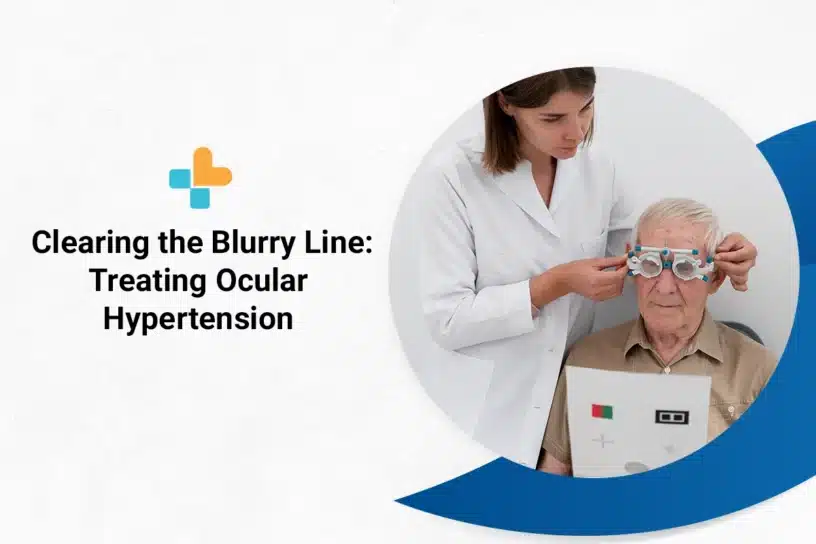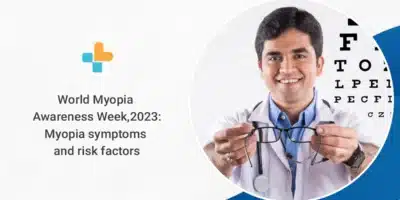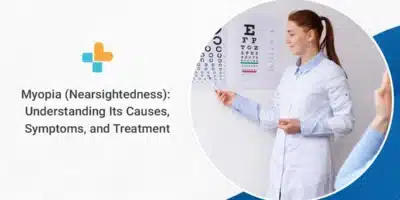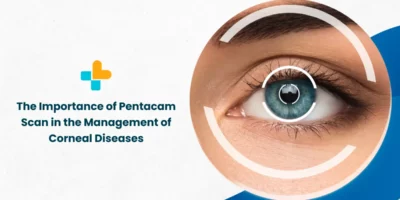Our eyes are the windows to the world, allowing us to see the beauty and wonder around us every day. Imagine if this field of vision gradually narrows until all you can see is a tiny pinhole. This is the reality for those living with glaucoma. And one of the many factors contributing to the likelihood of developing glaucoma is ocular hypertension.
Ocular hypertension (OHT) is a condition that can cloud vision, and if left untreated, it can lead to serious eye damage and even blindness.
Who is at risk for ocular hypertension, what causes it, and how does it affect the eye? Keep reading this blog to learn more.
What Is Ocular Hypertension?
Ocular hypertension is when intraocular pressure or pressure inside the eye is higher than normal.
Human eyes are filled with fluid called aqueous humour that keeps the eye inflated like a ball. Imbalance in the production and drainage of this fluid causes a build-up of internal eye pressure leading to ocular hypertension.
Normal eye pressure ranges from 10 to 21 mmHg. Ocular hypertension is an eye pressure of greater than 21 mmHg.
Ocular hypertension is not the same as glaucoma. However, people with this condition are at increased risk for glaucoma.
Prevalence of Ocular Hypertension
Raised intraocular pressure (IOP eye) is a well-known risk factor for primary open-angle glaucoma. It’s estimated that around 11.2 million persons aged 40 years and older have glaucoma in India, of which primary open-angle glaucoma is estimated to affect 6.48 million persons.
Population and clinical-based studies report that 0.24 to 2.2% of ocular hypertension (OHT) progresses to primary open-angle glaucoma per year.
These statistics emphasize the need to identify and closely monitor people with ocular hypertension who may be at risk of developing glaucoma.
Risks and Symptoms of Ocular Hypertension
Ocular hypertension usually has no signs or symptoms. One can have high eye pressure and not know it. Hence, it’s essential to have regular eye exams with your ophthalmologist to minimize the chances of glaucoma.
The risks associated with ocular hypertension are as follows:
- Optic nerve damage: Long-term undiagnosed ocular hypertension damages the optic nerve leading to vision loss.
- Loss of peripheral vision: Untreated ocular hypertension leads to peripheral vision loss, affecting the ability to see objects on the side.
- Reduced contrast sensitivity: People with ocular hypertension may experience reduced contrast sensitivity, making it difficult to distinguish between colours.
- Higher risk of cataracts: There may be a higher risk of developing cataracts in people with ocular hypertension.
Factors That Determine Ocular Hypertension
Anyone can develop ocular hypertension, but some people have a higher risk for this condition. An individual’s chances of developing ocular hypertension depend on the following factors.
1. Age
With age, the drainage system in the eye can become less efficient, leading to an increase in intraocular eye pressure. Individuals over the age of 40 are at increased risk of ocular hypertension.
2. Ethnicity
Findings suggest people of African-American, Hispanic, Caribbean, and Asian ethnicity have thinner corneas, which may account for the increased likelihood of developing ocular hypertension or glaucoma.
3. Family History
An individual is more likely to develop ocular hypertension if an immediate family member is diagnosed with it or has a history of glaucoma.
4. Medical Conditions
People with certain medical conditions, such as diabetes, high blood pressure, and cardiovascular disease, as well as people with eye injuries or previous eye trauma, are at higher risk of developing ocular hypertension.
5. Myopia
Extreme conditions of long-sightedness (hyperopia) and short-sightedness (myopia) can also contribute to ocular hypertension. This may have to do with the optic disc’s different shape, which increases the vulnerability to optic nerve damage.
Diagnosis of Ocular Hypertension
A routine eye test at the ophthalmologist may help in the early diagnosis of ocular hypertension. The following quick and pain-free tests may be further required to assess if the patient has ocular hypertension:
- Tonometry for measuring the intraocular fluid pressure (IOP)
- The cornea, anterior chamber, iris, and lens are examined using a special microscope called a slit lamp
- Checking optic nerve damage by dilating and imaging it
- Visual field test (perimetry) to measure peripheral vision or check blind spots in the eye
- Pachymetry test performed to determine corneal thickness
- Gonioscopy for examining the drainage angle of the anterior chamber (front of the eye)
Treatment for Ocular Hypertension
The course of treatment for ocular hypertension depends on the individual patient’s severity of the condition. If symptoms like halos, blurred vision, and an increase in intraocular pressure are present, your ophthalmologist will most likely start medical treatment.
Unless there’s optic nerve damage, there’s no need for advanced treatments, and the ophthalmologist may prescribe eye-drop medicine for slightly elevated IOP.
If the eye medications become intolerable and ineffective, laser and surgical therapy could also be suggested.
Outlook for Ocular Hypertension
With the right approach, the prognosis for people with ocular hypertension looks promising.
Careful follow-up care and compliance with medical treatment enable most people with ocular hypertension to retain good vision throughout their lifetime without progressing to primary open-angle glaucoma.
Ultimately, staying informed, having regular comprehensive eye examinations, and getting the right treatment from trusted sources, likeAyu Health, is your best bet for having a healthy vision.
To understand more about your options and choose the best medical intervention for ocular hypertension, get in touch with Ayu Health today. To book an appointment, visit our website.
Our Hospital Locations
Ophthalmology Surgery Hospitals in Chandigarh | Ophthalmology Surgery Hospitals in Bangalore | Ophthalmology Surgery Hospitals in Jaipur | Ophthalmology Surgery Hospitals in NCR | Ophthalmology Surgery Hospitals in Hyderabad
Our Doctors
Ophthalmology Surgery Doctors in Chandigarh | Ophthalmology Surgery Doctors in Bangalore | Ophthalmology Surgery Doctors in Jaipur | Ophthalmology Surgery Doctors in NCR | Ophthalmology Surgery Doctors in Hyderabad
About the Author

Dr. S. Goel
Dr. S. Goel is a renowned Internal Medicine Specialist currently practicing at Ayu Health, Bangalore. He is a Specialist in Internal Medicine, Diabetes HTN, Paediatric Care, and Family Medicine.




